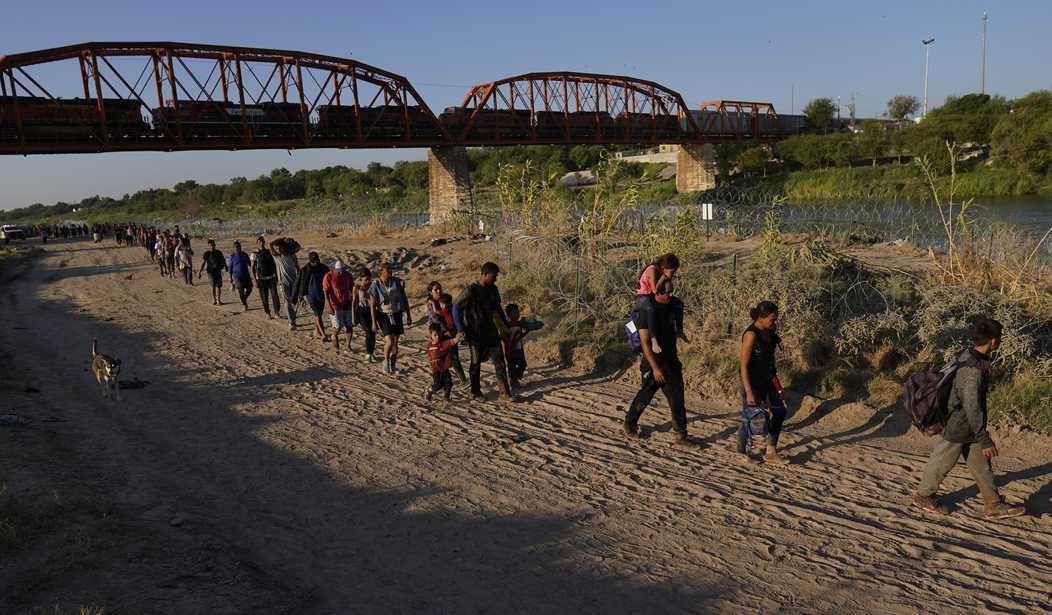In less than one week, from December 17 to December 20, 12,000 illegals were encountered by Border Patrol at Eagle Pass, Texas. The criminal and terrorist cartels, not the Biden Administration, determine who enters. Biden has not only abdicated his constitutional duty to take care that the immigration laws are faithfully executed, but he has also refused to exercise his Article II obligation to function as a Commander-in-Chief by defending the United States against foreign invasion. Indeed, he has threatened to employ the nation’s military not against the criminal cartels but against Texas for daring to defend itself and its people from a massive illegal invasion.
Biden’s actions usurp the irreducible reserved power of the states to defend themselves. The matter is ripe for the Supreme Court to rise in defense of the Constitution and against Biden’s abuses, but will it?
Among those crossing into the U.S. and being processed as asylum seekers; signed up for welfare, food stamps, and Medicaid; provided cash; and given tickets by federally funded non-governmental organizations to locations across the country are not only criminal trespassers but also violent offenders and national security risks--drug traffickers, sex traffickers, gang members, spies, and terrorists.
The Biden Administration demands that Texas not take any action to prevent virtually unrestricted entry. Texas refuses, explaining that it cannot countenance the ruination of its state and citizens. Texas is demanding that the feds stand down to allow the Texas State Guard and the National Guard summoned by Governor Abbott to do what the feds refuse to do: secure the Texas border. The Guard continues to hold the line against federal Border Patrol at Shelby Park in Eagle Pass. A constitutional crisis is upon us. Which sovereign, federal or state, has the Constitution on its side? Under the plain and intended meaning of Article I, Section 10, Clause 3, Texas has an expressly recognized, retained power to defend its state and people against invasion and imminent danger.
Recommended
Texas and National Guard have placed concertina wire over the 47-acre Shelby Park. Those Guard now occupy the Park area, restricting U.S. Border Patrol access and preventing removal of the wire. In a 5-4 decision, the Supreme Court vacated without opinion a Fifth Circuit decision enjoining the U.S. Border Patrol from removing the wire, but Texas will not budge and insists that the wire remain. Biden threatens force against Texas, but Governor Abbott has thus far remained resolute in opposition. Biden has not yet federalized the National Guard or sent the U.S. military into Shelby Park to confront the Guard.
Under the Constitution, no state relinquished its power of self-defense when entering the Union. The reservation of self-defense power is confirmed not only by constitutional provisions recognizing the existence of state militia but also by the specific language of Clause 4 of Article I, Section 10 and the general language of the Tenth Amendment.
“No State shall, without the Consent of Congress, . . . keep troops, or Ships of War in time of Peace, enter into any Agreement or Compact with another State, or with a foreign Power, or engage in War, unless actually invaded, or in such imminent Danger as will not admit of delay,” Section 10 reads in pertinent part.
If a state is “actually invaded” or is “in such imminent Danger as will not admit of delay,” it is possessed of even war power. But what did the Founding Fathers mean by “actual invasion?”
In Melendez v. City of New York, 16 F.4th 992, 1018 (2d Cir. 2021), the Second Circuit confirmed that a state may make war “if it is ‘actually invaded’ or facing ‘imminent Danger’ not admitting of delay.”
On June 16, 1788, in the Virginia debate on ratifying the Constitution, James Madison elucidated the meaning of Section 10. For Madison, the term “actual invasion” was not narrow in scope. It embraced even mere trespassers who entered a state before they committed a single act of criminality. He gave an example of Section 10’s applicability in Virginia: “There were a number of smugglers” who entered Virginia, he explained, “who were too formidable for the civil power to overcome. The military quelled the sailors, who otherwise would have perpetrated their intentions.” That action he used to illustrate the meaning of Section 10.
To a far greater extent than smugglers entering Virginia, those entering Texas include individuals who have engaged in theft, drug trafficking, sex trafficking, conspiracy to commit acts of terror, and even murderers. Texas has the retained power to repel the invasion in defense of Texas and Texans. The mere presence of federal law investing in federal authorities a power to protect the border is of no consequence when the power is not being used to stop the invasion. Rather, Texas is “actually” being invaded and is facing imminent Danger to the lives, liberties, and properties of its people. If the massive illegal entry into Texas does not constitute an ”invasion” within the meaning of this Section, nothing could qualify. A construction so limited would disable sovereigns, the states, from exercising their retained powers to defend citizens of the states when the federal government fails to do so.

























Join the conversation as a VIP Member